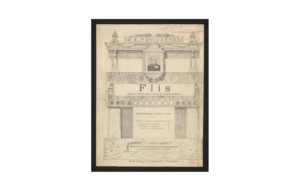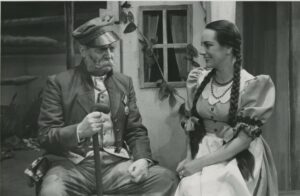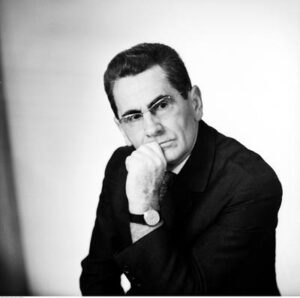I am happy to announce that the first CD from the series Heritage under the label of Anaklasis, launched by PWM Editions, was published at the end of last year. This remastered archival recording of Flis (The Raftsman), one of the lesser-known operas by Moniuszko, is a solid contribution to the discography of Polish music. The CD is available at the PWM’s online shop (https://pwm.com.pl/en/sklep/publikacja/flis,stanislaw-moniuszko,22187,shop.htm). Instead of a teaser, I post my text from the CD booklet, where I explain the whole story and give some information about the artists involved. Enjoy!
***
No, Moniuszko didn’t like it in Paris at all. Possibly he was worn out by his journey to France via Germany, which took more than a month and abounded in artistic disappointments as well as “draining his pockets thoroughly.” He may also have felt uncomfortable in the busy metropolis, vibrant with life, or he simply couldn’t afford the city’s numerous pleasures. The unbearable heatwave didn’t help, either. Whatever the reasons, he was disgusted, and vented his frustration in a letter to his daughter written in mid-June 1858, where he wrote that the Parisian theatres were “splendid, but very untidily maintained; the foyers are extremely narrow, very much as in the Vilnius dress circle. […] The change of sets makes as much whistling noise as a locomotive […] The singers at Le grand opéra are the worst, but at the Opéra Comique they are exquisite […] the ballet is better in Warsaw. The orchestra and choirs are excellent, but lower standard than in Germany. The sets are dirty because they are worn out. […] All in all, the theatres have not satisfied me at all, and since I arrived in Paris, I only once managed to sit through an entire play.” It was most likely all these circumstances that gave rise to the legend of how the composer hid in a hotel in Rue de Gramont, closed all the shutters, lit the candelabra, set up his portable desk, and completed the score of his new opera The Raftsman, to a libretto by Stanisław Bogusławski, in a mere four days. But in reality, if he indeed wrote anything in Paris, it was no more than a general outline of his ‘one-act piece from the Vistula valley’. That it wasn’t much more becomes evident when we read his later correspondence with his wife, in which he complains that, the more he works on Flis, “the more work appears ahead of him.”
All this work notwithstanding, the opera does bear the mark of haste. Moniuszko was eager to exploit the recent success of his Halka; especially so since General Ignacy Abramowicz, President of Warsaw’s Government Theatres, was planning to entrust the post of opera conductor to Moniuszko and so was impatiently looking forward to more scores. Most problematic for Moniuszko was the libretto, which, despite the great potential of the theme, proved stylistically inconsistent and rather clumsy in terms of literary form, especially if we compare it with Wolski’s masterfully constructed Halka. Stanisław Bogusławski, son (born out of wedlock) of the more famous Wojciech, was a reasonably good comedy writer, a columnist known for his jovial sense of humour, and a solid supporting actor. His experience as a librettist, however, was limited to collaboration with Józef Damse on the latter’s opera The Sea Smuggler after Walter Scott. The composer did his best to cover up the shortcomings of the narrative structure by adding graceful choruses, a number of tuneful, frequently virtuosic arias, and skilfully constructed ensemble scenes. He also prefaced the whole with an atmospheric and brilliantly instrumented overture. The Raftsman, conceived as an unpretentious ‘scene of country life’ (as clearly suggested by the references to folk dances in the choruses “O come young raftsman” and “The rafts sail along the Vistula”), demonstrates surprisingly many affinities with the Italian opera, as well as with the works of Auber, Meyerbeer and Halévy, with which Moniuszko familiarised himself, among others, during his “boring” stay in Paris, whose theatres “did not satisfy him at all.”
All the same, Moniuszko’s one-act opera drew the admiration of the audience on the night of the premiere (24th September 1858) and was received rather favourably by the contemporary critics. “Kurier Warszawski” reported (in issue no. 253) that “the music [was] lovely, some numbers received an encore, and an undying applause continued throughout the spectacle.” What certainly contributed to this success was the composer himself as conductor, as well as perfectly selected soloists: Paulina Rivoli and Julian Dobrski, who had sung the parts of the unfortunate highland girl and of Jontek in the recent Warsaw production of Halka, and now returned as Zosia and Franek. Also excellent was the singing actor Alojzy Żółkowski, portraying the troublesome Warsaw salon hairdresser and barber Jakub – a great comedian and “an extraordinary phenomenon, hitherto unparalleled on any stage,” as Władysław Bogusławski later described him.
The Raftsman became a repertoire staple at Polish opera houses, and was frequently staged together with Verbum nobile on the same night. Two years after World War II came to its close, The Raftsman was also presented in the open air on the river cruise route from Warsaw to Gdynia by the Polish Rivers Opera, consisting of musicians from Cracow Opera and Philharmonic. Its postwar comeback to the stage took place in 1949 at Poznań Opera. The most recent staging, prepared in 2003 by the Szczecin Castle Opera (Opera na Zamku), was the last of the ten postwar productions of the work which, as Moniuszko hoped, would quite “preoccupy the minds” of the audience.
The Raftsman at the Opera Śląska in Bytom (1954). Antoni Majak (Antoni the Fisherman) and Maria Kunińska (Zosia). Photo: Bronisław Stapiński
The archive recording of The Raftsman that we present here, made in 1962, deserves to be recalled first and foremost as a priceless document of the great abilities of Polish opera singers in that era. The enamoured Zosia was sung by Halina Słonicka, who came from the Polish Eastern frontier (she was born in Charniany near Kobryn, now in Belarus), who had taken up secondary music education following her success in the ‘Looking for Young Talents’ competition, dropping her architecture studies at the Warsaw University of Technology. A year later she became a pupil of Magdalena Halfterowa, who remained her tutor until graduation. In 1957, still as a student at Warsaw’s State Higher School of Music, Słonicka was engaged as a singer at Warsaw Opera. An extremely versatile artist, blessed with a warm soprano of beautiful timbre, she demonstrated extraordinary musicality and sense of style. Her interpretation of the famous dumka “Ah! Perhaps amid this storm” delights with the masterful legato, while in duets with Szóstak she displays her impeccable coloratura technique.
Her partner is Bogdan Paprocki as Franek. This perhaps the most outstanding of lirico-spinto tenors in the entire postwar history of Polish opera made his debut still before the war, in a barbershop quartet during an evening show held in April 1939 by cadets from the Zamość Reserve Officer Cadet School. He took singing lessons from, among others, Ignacy Dygas, one of Poland’s best Wagnerian tenors. His professional career began at the Silesian Opera in Bytom, with the role of Alfredo in Verdi’s Traviata. He soon gained fame as a Moniuszko soloist nonpareil, especially with his interpretations of the parts of Jontek in Halka and Stefan in The Haunted Manor. Notably, in the role of Franek he appeared on the stage only once in his life, at the Silesian Opera, virtually directly after the studio recording of The Raftsman. Until an old age Paprocki continued to impress audiences with his brilliantly controlled tenor voice, distinguished by a recognisable golden-tinged timbre and impeccable intonation.
Bogdan Paprocki. Photo: Edward Hartwig
Jakub the Hairdresser sings with the unforgettable, velvety and melancholy baritone of Andrzej Hiolski, considered one of the most beautiful of its kind, not only in Poland. He made his debut during World War II at Cracow’s Stary Theatre as Janusz in Moniuszko’s Halka. Later he was a soloist of the Silesian Opera in Bytom and sang for many years at Warsaw’s Teatr Wielki. He went down in history as the phenomenal Sword Bearer in Moniuszko’s The Haunted Manor, the terrifying Scarpia in Puccini’s Tosca, and the unequalled model of Szymanowski’s King Roger. He won the audiences’ hearts with his extraordinary vocal culture and intelligent interpretations, especially of the song repertoire. Famed for his versatility, he was one of the few opera singers in that period who did not shun contemporary music; this preoccupation bore fruit, among others, in the form of excellent interpretations of parts in Penderecki’s St Luke Passion and The Devils of Loudun.
At the premiere performances of both these latter works, Hiolski shared the stage with Bernard Ładysz, the living legend of Polish vocal art. Ładysz and Hiolski were of the same age and for many years they sang together in Warsaw, where Ładysz is remembered first and foremost for his unsettling Boris Godunov in Mussorgsky’s eponymous opera. Endowed with an extremely strong, dark but warm bass-baritone, in The Raftsman Ładysz gives a very convincing portrayal of the old campaigner Szóstak, most notably – in his exquisite duet with Jakub (“Good sir, why such haste?” / “I’m a salon hairdresser”).
Antoni Majak, who sang the part of Antoni the Fisherman, deserves a separate mention. This now unjustly forgotten bass debuted before the war as a Warsaw Opera soloist. From the early 1950s onward, he successfully directed opera productions on Poland’s best stages. The oldest habitués of the Silesian Opera recall (with much nostalgia) his appearances as Kecal in Smetana’s The Bartered Bride, a role that calls not only for excellent vocal technique, but also for considerable acting skills and a sense of humour.
The cast also includes Zdzisław Nikodem in the minor part of Feliks. This excellent leggiero tenor, a soloist of Warsaw’s Teatr Wielki, also performed from its very beginnings at Warsaw Chamber Opera.
The soloists, Warsaw Philharmonic Orchestra and Choir are conducted in this studio recording by Zdzisław Górzyński, possibly the most successful interpreter of the composer’s specific style in the history of Moniuszko recordings in Poland. Górzyński was born into a Jewish family that boasted fine musical traditions. His father, Józef Grünberg, played the violin in the orchestra of Johann Strauss the Younger. Górzyński studied conducting with Franz Schalk, the would-be director of Vienna’s Staatsoper. He felt equally at ease in the core operatic repertoire and in operettas by Lehár or Offenbach. His interpretations were full of internal dynamism, wonderfully nuanced in terms of dynamics, rhythms and tempi. He maintained a perfect balance between the soloists and the orchestra, which together formed one living, pulsating organism. The 1965 recording of (excerpts from) Halka under his baton, featuring choice soloists and the ensembles of Warsaw’s Teatr Wielki, still remains unrivalled after all the years. As for his interpretation of The Raftsman, we have rather little to compare it with.
This is a shame since, as Zdzisław Jachimecki reluctantly admitted, “this music has its assets after all.” In Górzyński’s interpretation, those assets become fully manifest.
Translated by: Tomasz Zymer



